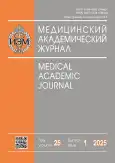Glucocorticosteroid-induced behavioral changes during endotoxinemia in rats
- Authors: Lebedeva E.Y.1, Kukushkina E.S.1, Tyutunnik T.V.2, Maystrenko V.A.2
-
Affiliations:
- Peter the Great Saint Petersburg Polytechnic University
- Institute of Experimental Medicine
- Issue: Vol 25, No 1 (2025)
- Pages: 82-89
- Section: Original study articles
- URL: https://journal-vniispk.ru/MAJ/article/view/312072
- DOI: https://doi.org/10.17816/MAJ631323
- EDN: https://elibrary.ru/IQVJRP
- ID: 312072
Cite item
Abstract
BACKGROUND: Experimental endotoxemia, based on the injection of lipopolysaccharide, is used to study systemic inflammation. Glucocorticosteroids, such as methylprednisolone and dexamethasone, play a key role in modulating inflammation. They affect inflammatory mediators and cellular components, penetrating the blood-brain barrier. However, the cerebral effects of glucocorticosteroids are not well studied. The assessment of behavioral changes induced by lipopolysaccharide and glucocorticosteroids using the “open field” test will help explore the neurobiological mechanisms of inflammation and stress.
AIM: Study of the effect of glucocorticosteroids on behavioral and physiological changes induced by experimental endotoxinemia in rats.
METHODS: Six groups of Wistar rats, 10 males in each group, were used in the experiment. The first group was injected once intraperitoneally with physiological solution, the second group was injected with lipopolysaccharide (1 mg/kg), the 3rd group was injected with i/p dexamethasone, 2 mg/kg; the 4th group was injected with i/p dexamethasone, 2 mg/kg, 2 h before lipopolysaccharide injection; the 5th group was injected with i/p methylprednisolone, 2 mg/kg; the 6th group was injected with i/p methylprednisolone, 2 mg/kg, 2 h before lipopolysaccharide injection. During the first 4 h of the experiment, deep body temperature of the rats was measured every 30 min and after 24 h to construct a temperature curve. At several time points, the behavior and locomotor activity of the rats were evaluated in the open-field test.
RESULTS: The results obtained demonstrate that lipopolysaccharide administration causes changes in behavioral patterns such as stance, minking, locomotion, act of grooming and frizzing. No differences were found in the effects of glucocorticosteroid depending on the drug. Application of glucocorticosteroid promotes restoration of motor activity of animals, elimination of negative effects of lipopolysaccharide.
CONCLUSION: The studied glucocorticosteroid drugs dexamethasone and methylprednisolone had comparable anti-inflammatory effect in terms of severity, caused normalization of body temperature and eliminated behavioral changes caused by lipopolysaccharide.
Full Text
##article.viewOnOriginalSite##About the authors
Elena Ya. Lebedeva
Peter the Great Saint Petersburg Polytechnic University
Author for correspondence.
Email: lena988902@yandex.ru
ORCID iD: 0009-0003-9034-2353
Postgraduate Student
Russian Federation, Saint PetersburgEkaterina S. Kukushkina
Peter the Great Saint Petersburg Polytechnic University
Email: Eskukushkina@mail.ru
ORCID iD: 0009-0008-2441-8889
Postgraduate Student
Russian Federation, Saint PetersburgTatiana V. Tyutunnik
Institute of Experimental Medicine
Email: t.tanjon11@yandex.ru
ORCID iD: 0000-0002-2427-9355
Research Assistant at the Pavlov Department of Physiology, Laboratory of Neurochemistry
Russian Federation, Saint PetersburgVictoria A. Maystrenko
Institute of Experimental Medicine
Email: Sch_Viktoriya@mail.ru
ORCID iD: 0000-0001-7004-7873
Junior Researcher at the Pavlov Department of Physiology, Laboratory of Neurochemistry
Russian Federation, Saint PetersburgReferences
- Skrzypczak-Wiercioch A, Sałat K. Lipopolysaccharide-induced model of neuroinflammation: mechanisms of action, research application and future directions for its use. Molecules. 2022;27(17):5481. doi: 10.3390/molecules27175481
- Suleymanova AM, Kulichenko TV. Safety of application of short courses of glucocorticosteroids: literature review. Pharmateka. 2017;11(344):6–13. EDN: ZFVJEZ
- Severyukhin YS, Lalkovičová M, Utina DM, et al. Comparative analysis of behavioral reactions and morphological changes in the rat brain after exposure to ionizing radiation with different physical characteristics. Cell Mol Neurobiol. 2023;43(1):339–353. doi: 10.1007/s10571-021-01187-z
- Chudova AS, Alekhina NA, Gladysheva AO, et al. Determination of individual-typological features of behavior in Wistar rats in the open field test. Trends in the development of science and education. 2022;(88(1)):130–133. EDN: NHDQHI doi: 10.18411/trnio-08-2022-38
- Gevorkyan VS. Study of the impact of the same stress factors on the behavior of rats of different species and lines. Electronic scientific edition Almanac Space and Time. 2017;15(1):1–5. EDN: ZXYVFB
- Bobyntsev II, Korobova VN, Vorvul’ AO, et al. Correlation of heart rate variability and behavioural indicators in wistar rats. Humans and their health. 2023;26(4):72–87. EDN: KEYOHB doi: 10.21626/vestnik/2023-4/07
- Cherepovskaya NA, Zhunusov NS, Miller ES. Study of behavioral activity in the test “open field”. Scientific electronic journal Meridian. 2020;(4):75–77. (In Russ.) EDN: USBXDY
Supplementary files









